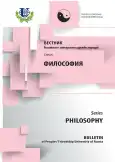Meister Eckhart Versus Nicolas of Cusa: Anti-Cusanian Argumentation in «De Ignota Litteratura» by John Wenck
- Authors: Khorkov ML1
-
Affiliations:
- Peoples' Friendship University of Russia
- Issue: No 4 (2010)
- Pages: 21-29
- Section: Articles
- URL: https://journal-vniispk.ru/2313-2302/article/view/345609
- ID: 345609
Cite item
Full Text
Abstract
There is no doubt that John Wenck touched in his polemical treatise the core issue in the late mediaeval debates on the Eckhart heritage and its compatibility to the dogmatically uncontroversial Christian theology and philosophy. His main point is obvious: Had Cusanus not read the German works by Meister Eckhart, he would not have constructed the bold and unconventional ideas of docta ignorantia and coincidentia oppositorum at all, and without intoxication by Eckhart's heterodoxy he would not make an attempt to write a treatise like «De docta ignorantia».
To conclude, the whole point of John Wenck's polemics with Nicolas of Cusa lies ultimately in dealing with formulations and ideas from the German texts of Meister Eckhart. Cusanus, who surely knew German Eckhartian and pseudo-Eckhartian tradition, would not surprisingly like remember and analyse them in «De docta ignorantia» and «Apologia doctae ignorantiae». Unfortunately, Wenck doesn't hesitate not to forget these controversial texts condemned in the bulla «In agro dominico» (promulgated by Pope John XXII in March 27, 1329) and by the theologians at the university of Heidelberg in 1430. In his critics on Nicolas of Cusa he can find no better parallel to the doctrines of docta ignorantia and coincidentia oppositorum of Cusanus than the teachings on the detachment, the birth of God in the intimate depths of the human soul, and the unity of the soul with Godhead advocated by the German Dominican friar Meister Eckhart.
About the authors
M L Khorkov
Peoples' Friendship University of Russia
Email: hphilosophy@mail.ru
Кафедра истории философииФакультет гуманитарных и социальных наук; Российский университет дружбы народов; Peoples' Friendship University of Russia
Supplementary files









